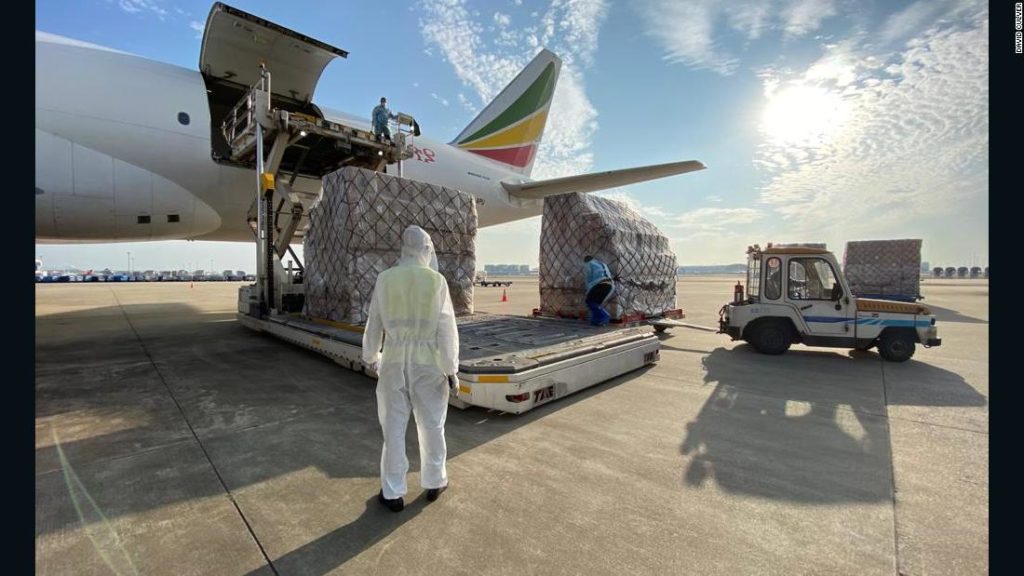A security worker in face mask, surgical gown and rubber gloves stands guard. Anyone entering this part of the warehouse has to either complete two weeks of quarantine or wear a head-to-toe hazmat suit.
In the coming months, China will be sending hundreds of millions of doses of coronavirus vaccines to countries that have conducted last-stage trials for its leading candidates. Chinese leaders have also promised a growing list of developing countries priority access to its successful vaccines.
The vaccines can also be used by Beijing as “an instrument for foreign policy to promote soft power and project international influence,” said Yanzhong Huang, a senior fellow for global health at the Washington-based Council on Foreign Relations.
Beijing’s vaccine diplomacy, Huang said, could give it another chance.
“Vaccine Diplomacy”
China currently has five coronavirus candidates from four companies which have reached phase 3 clinical trials, the last and most important step of testing before regulatory approval is sought.
Having largely eliminated the coronavirus inside its borders, Chinese drugmakers had to look abroad for places to test the efficacy of their vaccines. Together, they have rolled out phase 3 trials in at least 16 countries.
In exchange, many of the host countries have been promised early access to the successful vaccines — and in some cases, the technology know-how to manufacture them locally.
“China not only has the political will (for its vaccine diplomacy), it also has the robust capacity to make that happen,” Huang said.
Because China has largely contained the virus, there’s no urgent need to vaccinate every one of its 1.4 billion population. “That gives it this leverage … to make deals with countries in need of the vaccines,” he said.
“Health Silk Road”
“So far we haven’t heard the US saying or suggesting they’re gonna earmark a percentage of their vaccine to support poor countries. So that puts China in an even better situation to use the vaccine to serve its foreign policy objective,” Huang said.
In October, China joined a World Health Organization-backed global initiative to ensure the rapid and equitable distribution of Covid-19 vaccines to rich and poor countries alike.
The project, known as COVAX, is designed to discourage governments from hoarding coronavirus vaccines and instead focus on vaccinating high-risk groups in every country. But it was shunned by the United States, partly because President Donald Trump did not want to work with the WHO, leaving a global public health leadership vacuum for China to fill.
From early on, Chinese leaders have repeatedly stressed that China’s vaccines are for sharing, especially with the developing world.
In a video summit with African leaders in June, Xi pledged that “once the development and deployment of a Covid-19 vaccine is completed in China, African countries will be among the first to benefit.”
In August, Chinese Premier Li Keqiang said Beijing would also give priority access to Cambodia, Myanmar, Laos, Thailand and Vietnam. Other countries that have been promised priority access by Chinese officials include Afghanistan and Malaysia.
Then there’s the question of efficacy. Last month, Pfizer and Moderna announced that early results showed their vaccines to be over 90% effective, while another candidate produced jointly by Oxford University and AstraZeneca had an average efficacy of 70%. So far, none of the Chinese vaccine candidates have announced any preliminary efficacy results, though company executives have repeatedly stressed their safety, insisting no serious adverse effect has been observed in vaccinated volunteers.
Cold storage
Compared with Pfizer and Moderna, Chinese vaccines have a crucial advantage — most of them do not require freezing temperatures for storage, making transport and distribution much easier, especially in developing countries that lack cold storage capacities.
Both Pfizer and Moderna’s vaccines use pieces of genetic material called messenger RNA (mRNA) to prompt the body to make synthetic pieces of the coronavirus and stimulate an immune response — a new technology that has not been used in existing vaccines.
Still, the required temperatures must be maintained throughout transport, from leaving the production facility to airport storage and finally to global distribution.
Cainiao, the logistics arm of Chinese e-commerce giant Alibaba, will help with the distribution of the Chinese vaccines as soon as they’re given the go ahead. It says its end-to-end climate controlled infrastructure is in place and ready.
Cainiao is also in partnership with Ethiopian Airlines, which will be sending the Chinese vaccines to the Middle East and then Africa. Since the pandemic, the airline has flown more than 3,000 tons of medical supplies from Shenzhen to Europe, Africa, the Middle East and South America.
But Cainiao is also looking to add more routes for greater global reach, according to its CEO Wan Lin.
“Of course, we are not still quite sure about the exact demand on that but we are definitely building our capability to be prepared for that,” Wan said.
CNN’s Emma Reynolds contributed to this story.
You may also like
-
UK coronavirus variant has been reported in 86 countries, WHO says
-
NASA technology can help save whale sharks says Australian marine biologist and ECOCEAN founder, Brad Norman
-
California Twentynine Palms: Explosives are missing from the nation’s largest Marine Corps base and an investigation is underway
-
Trump unhappy with his impeachment attorney’s performance, sources say
-
Lunar New Year 2021: Ushering in the Year of the Ox

